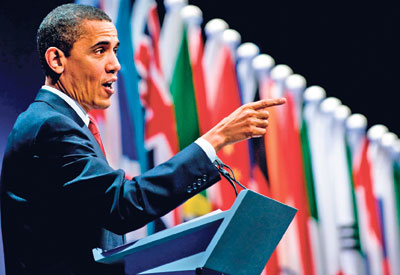NEW YORK - When Barack Obama took office as President, he inherited a country in political and economic shambles. The US was not only one of the most hated and vilified countries in the world -- largely because of the destructive foreign policy of the Bush administration -- but also a nation that helped trigger a monstrous financial crisis that has spread to the far corners of the world.
If one is to bring an element of ethnicity and race into the argument, it is obvious the white guys screwed up the country and then handed it over to a black guy to clean up the monumental mess.
But judging by his Oscar winning performance at the G20 summit in London last week, the half-white, half-black president (which half is white, and which half is black is still a guessing game among cynics) has proved his credentials to lead the world -- if not the United States.
 |
| US President Barack Obama speaks during a press conference following the G20 summit at the ExCel centre in east London on Thursday. AFP |
Meanwhile, Brazil's populist and outspoken President, Luiz Inacio Lula da Silva (does he have any long lost relatives of Portuguese origin in Sri Lanka?), also injected an element of race when he blamed the white guys for the global financial meltdown.
The economic crisis, he pointed out, was caused by "the irrational behaviour of white people with blue eyes. Before the crisis they looked like they knew everything about economics, and they have now demonstrated they know nothing about economics." It was a great sound bite -- in spectacular colour.
When he made these caustic remarks at a news conference in Brasilia last month, Lula was standing beside British Prime Minister Gordon Brown. The Brazilian president's comments, although not directed at Brown, hit a raw nerve both at home and abroad. Still, he was almost dead on target.
At one time the global economy was shaped and dictated to by the G6: the world's six major industrialised nations, namely the US, Britain, France, Germany, Italy, and Japan. With the exception of Japan, the rest were from the Western world.
Canada joined later to transform the group into the G7. But there were still no developing nations, although the decisions of the G7 also impacted heavily on the developing world. When Russia was admitted, the group became the G8, as it existed last year. The G20 that met in London last week brought in some of the world's major developing nations, including China, India, Brazil, Indonesia, Argentina, Mexico, Saudi Arabia, South Africa, South Korea, Turkey, along with Australia and the 27-member European Union (which also includes the former East European states). The original G6 had at last come of age. And rightly so.
The global economy is so closely interlinked that every action by the Western industrialised nations will have an impact on the developing world -- and vice versa. The Western world couldn't afford to ignore the powerhouses of the developing world, including India, China and Brazil.
Obama, who is fully conscious of this, told reporters last week: "We've got a global economy, and if we're taking actions in isolation in the United States, but those actions are contradicted overseas, then we're only going to be halfway effective -- maybe not even half."
Raising loud laughter among reporters, he said that if 10 or 30 years ago, someone had said that the leaders of Germany, France, China, Russia, Brazil and South Africa, along with a President of the United States named Obama (laughter), were negotiating with former adversaries, in some cases former mortal enemies, to fix the global economy, you would have said, "that's crazy."
And yet that was what happened at the G20 summit meeting in London last week. Obama, however, paid a compliment to the "great work" that British Prime Minister Gordon Brown and his team did, in organizing the summit. As a result, the summit agreed on a commitment to provide a whopping $1.1 trillion in aid to the global economy.
The breakdown included some $500 billion in increased resources to the International Monetary Fund (so the request for $1.8 billion from Sri Lanka would be peanuts); $250 billion in new Special Drawing Rights to be shared among the 186 IMF members; $100 billion in increased lending by multilateral development banks; $250 billion in increased support for trade finance; and $6 billion in additional lending to the world's poorest countries financed by IMF gold sales.
The US, Japan and the EU pledged about $100 billion each, with $40 billion coming from China. In a world that's more and more interconnected, said Obama, "we all have responsibilities to work together to solve common challenges". The bottom line is that the era of the Western world running the global economy single-handedly is coming to an end. Perhaps it was best illustrated in an example Obama quoted at the news conference last week.
"I just think in a world that is as complex as it is, it is very important for us to be able to forge partnerships, as opposed to simply dictating solutions. Just to try to crystallize the example, there's been a lot of comparison here with the 1944 Bretton Woods conference (a conference which resulted in the creation of an international monetary system, along with the World Bank and the IMF)."
"Oh, well, last time you saw the entire international architecture being remade (at Bretton Woods). Well, if there's just Roosevelt and Churchill sitting in a room with a brandy, that's an easier negotiation. (Laughter.) But that's not the world we live in, and it shouldn't be the world that we live in." |

